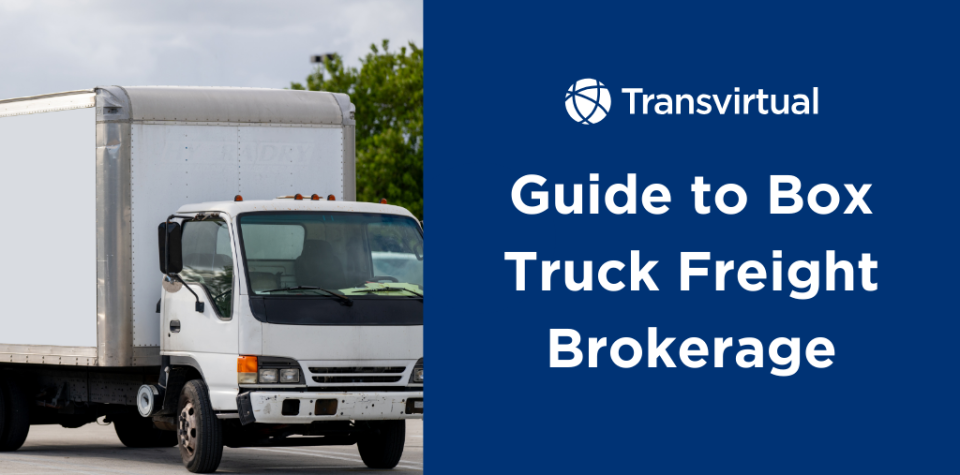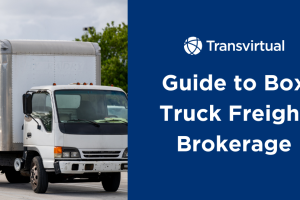Table of Contents
Box trucks are a significant portion of the nearly 38 million trucks registered for business purposes in the U.S.
Box truck drivers play a crucial role in the logistics and freight delivery process, connecting with various freight brokers and load boards. They are vital for making efficient, reliable deliveries in cities where larger vehicles would be impractical.
For many businesses, especially those operating within densely populated urban areas or managing smaller, frequent loads, box truck freight brokerage is at the center of their logistics strategy.
Find out what you need to know about box truck freight brokerage, what is a straight truck, and how to find brokers for box trucks in this article.
What is Box Truck Freight Brokerage?
Box truck freight brokerage involves connecting shippers with box truck carriers through intermediaries, freight brokers.
Selecting the right freight load broker is crucial for successful freight matching, as these brokers connect truck owners and carriers with suitable loads, improving operational efficiency and fostering beneficial partnerships that can lead to increased business opportunities and growth.
Wait, What is a Box Truck, Anyway?
Box trucks, often referred to as straight trucks, generally range from 10-26 feet in length, and are ideal for delivering furniture, appliances, parcels, and other items that need secure transport.
They are characterized by their rigid bodies and enclosed cargo areas. These trucks are typically used for local or regional deliveries, offering a practical solution for transporting goods that require protection from the elements.
Using box trucks for urban deliveries can reduce transportation costs by up to 20% compared to larger trucks due to better fuel efficiency and lower maintenance costs.
The gross vehicle weight rating (GVWR) of box trucks is an important factor, as it determines the weight classification and whether a commercial driver’s license (CDL) is required for operation.
Straight trucks come in various configurations, including those with lift gates for easier loading and unloading, temperature-controlled units for transporting perishable goods, and high-cube models for maximizing cargo space. This versatility and adaptability make them an essential asset across a wide variety of environments.
The Critical Role of Freight Brokers
Freight brokers specializing in box truck loads (hence the term box truck freight brokers or box truck load brokers) play a crucial role in ensuring that shipments are delivered efficiently and on time. They match shippers, who have goods that need to be transported, with carriers that have available box trucks. Load boards are essential in this process, providing specialized platforms for connecting box truck drivers with available freight loads, streamlining operations, and maximizing earnings.
This matching process involves considering various factors such as the size and weight of the cargo, delivery timelines, and geographic coverage. By leveraging the expertise of a freight broker, businesses can optimize their shipping processes, reduce transportation costs, and enhance customer satisfaction.
Trucker tools, including essential software and applications, further optimize load searches through real-time data, increasing efficiency in connecting with freight brokers.
How to Find Box Truck Loads Freight Brokers
Finding reliable brokers for box trucks involves more than just networking, online directories, and referrals. Leveraging data analytics and technology platforms can offer deeper insights into broker performance metrics like on-time delivery rates, load acceptance rates, and customer feedback scores. For owner operators, finding reliable loads and establishing strong connections with freight brokers can significantly enhance their trucking operations.
By analyzing this data, businesses can identify top-performing brokers who consistently meet high standards of reliability and efficiency.
Additionally, these platforms often provide reviews and ratings from other shippers, giving a comprehensive understanding of a broker’s reputation. Box truck drivers should also be aware of the regulations surrounding the commercial driver’s license (CDL). While a box truck can be driven without a CDL if it meets specific weight limits, a CDL is required for heavier vehicles or those transporting hazardous materials.
Another advanced strategy is engaging with freight audit and payment companies. These firms specialize in auditing freight bills and ensuring accurate payment processing. Partnering with them provides access to detailed reports on various brokers’ performance, including trends and patterns that might not be immediately apparent. This level of scrutiny helps businesses select brokers who offer competitive rates and demonstrate long-term reliability and ethical business practices.
Participating in industry-specific forums and online communities can also be valuable. Going beyond Truckstop, DAT, and Freight Broker Planet, you should be connecting through LinkedIn groups, Reddit’s logistics subreddits, and specialized logistics forums. These are the best places to access professional experiences, discuss trends, and get recommendations based on insights from real-world experiences.
This method also allows direct interaction with potential brokers, enabling businesses to ask specific questions and gauge the broker’s expertise and responsiveness. Combining these digital community insights with other analytical approaches offers a well-rounded strategy for finding the best brokers for box truck logistics.
Box Trucks, Freight Brokerage, and Growing Your Business
Without box trucks, urban deliveries would be slower, less efficient, and more costly. This is where freight brokers specializing in box truck services come in. They ensure that shipments are matched efficiently with the right carriers, considering factors such as cargo size, delivery timelines, and geographic coverage.
Owner operators can effectively find freight loads by using real-time load boards and securing contracts with shippers, which are crucial for maintaining a steady workflow and maximizing operational efficiency.
This process not only optimizes shipping but also reduces transportation costs and enhances customer satisfaction.
No matter what type of truck best fits your current needs, what matters most is how you utilize digital logistics tools. They are essential for streamlining the entire logistics process, from optimizing load matching and route planning to providing real-time tracking and analytics. Advanced software solutions empower businesses to reduce transportation costs, improve efficiency, and enhance customer satisfaction.
Uncover more indispensable strategies to propel your company’s growth. Check out our blog now for more insights.




